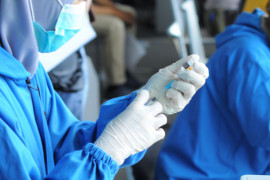Health Minister Nila Moeloek has emphasized that inter-ministerial coordination in dealing with health problems is now getting better, and should be further enhanced through the program of Healthy Living Community Movement (Germas), initiated by PresJakarta (ANTARA News) - The challenge of the health sector in the 72nd year of the independence of the Republic of Indonesia is to unite and integrate cross-ministerial programs in support of healthy Indonesian society.
Synergy and collaboration between ministries and institutions remain a challenge for the government of Indonesia ahead of the 72nd anniversary of Indonesias independence.
However, Health Minister Nila Moeloek has emphasized that inter-ministerial coordination in dealing with health problems is now getting better, and should be further enhanced through the program of Healthy Living Community Movement (Germas), initiated by President Joko Widodo, better known as Jokowi.
Germas aims to change peoples behavior and encourage them to adopt a healthier lifestyle, as health does not happen by accident but requires work, smart lifestyle choices, and the occasional medical checkup and test.
Making small, consistent changes to their daily routine can become healthy habits that improve their overall well-being. Maintaining a healthy diet, getting adequate sleep and being physically active can become a part of their regular day.
Hence, the health minister has expressed hope that the awareness of health will increase both in society and government in issuing policies that support a healthy lifestyle ahead of the 72nd anniversary of the Independence of Indonesia.
To build a strong country, Moeloek said it would start from human quality that was also closely related to health.
"The basis is health, family planning, children with ideal body weight; and therefore, a mother should be able to maintain the health of her children," the health minister remarked.
She acknowledges that the work to awaken everyone about the importance of maintaining health is quite difficult, and this is proven by statistics showing that only 20 percent of Indonesians really understand the importance of maintaining health.
To continue improving the health of Indonesians on this 72nd anniversary of independence, Moeloek emphasized the importance of inter-ministerial roles in dealing with health issues that cannot be handled by the Ministry of Health alone.
"All the relevant ministries should cooperate and integrate to address these health problems," the health minister remarked in Jakarta on Monday.
She explained that the Ministry of Health needs the role of other ministries to create a healthy lifestyle in the community.
Moeloek on Monday gave away awards to 258 health personnel of community health centers from all regions of Indonesian for their achievement and dedication in performing their duties to provide health services to people.
"I appreciate the health workers of community health centers for providing exemplary health service to the people with a conscience, sincerity, and responsibility," she stated.
Moeloek acknowledged the challenges faced by health personnel in providing services to the community in different geographical areas of each region of Indonesia.
In addition, budget limitations for the procurement of health facilities and provision of health equipment have been prioritized for the needs of the community health centers.
She invited health workers to change the pattern of health services from curative or healing approach to a more promotional and preventive approach.
Moeloek urged the personnel of the community health centers to proactively identify the cause of the disease from the neighborhood domain and to encourage a healthy lifestyle at an early age in the community.
Adopting healthy habits at an early age can makes it much easier to stick to it, as it can be difficult enough to change them later in life.
From kindergarten and continuing through high school, a comprehensive health education on healthy lifestyle should be an important part of the curriculum.
The middle years of childhood are extremely sensitive periods in terms of a number of health issues, especially when it comes to adopting health behavior that can have lifelong consequences.
Youngsters might be exposed to a variety of health themes in school such as nutrition, disease prevention, physical growth and development, reproduction, mental health, drug and alcohol abuse prevention, consumer health, and safety.
The goal of this education is not only to increase the youngsters health knowledge and to create positive attitudes toward their own well-being but also to promote healthy behavior.
Realizing the importance of the aspect of health in children, the Indonesian Healthcare and Social Security Agency (BPJS Kesehatan) has encouraged the elementary school students in Aceh Province to lead a healthy lifestyle to avoid various diseases later in life.
"Healthy lifestyles from an early age will prevent our children from catastrophic diseases such as kidney failure, cancer, stroke, heart disease, and other ailments," BPJS Kesehatan Deputy Director of North Sumatra and Aceh Region, Dr. Budi Mohamad Arief, remarked in Banda Aceh recently.
Such diseases are so common and cause emotional and physical pain and disability, but they are preventable at least through lifestyle changes.
When blood flow to a part of the heart is blocked, it leads to a heart attack, which is often the result of plaque build-up inside the arteries, which may rupture and form a blood clot that blocks the flood flow.
If the blockage is not cleared quickly, a portion of the heart muscle will begin to die and be replaced with scar tissue, which can cause severe problems in the future.
However, researchers have found that engaging in healthy lifestyle habits could prevent nearly 80 percent of first-time heart attacks in men. It surprised them to know how powerful a healthy lifestyle could be.(*)
Reporter: Otniel Tamindael
Editor: Heru Purwanto
Copyright © ANTARA 2017











